Related Research Articles
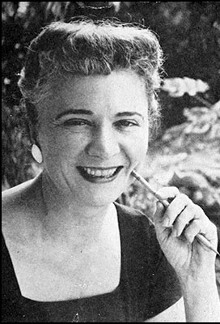
Catherine Lucille Moore was an American science fiction and fantasy writer, who first came to prominence in the 1930s writing as C. L. Moore. She was among the first women to write in the science fiction and fantasy genres, though earlier woman writers in these genres include Clare Winger Harris, Greye La Spina, and Francis Stevens, among others. Nevertheless, Moore's work paved the way for many other female speculative fiction writers.

Edward Groff Conklin was an American science fiction anthologist. He edited 40 anthologies of science fiction, one of mystery stories, wrote books on home improvement and was a freelance writer on scientific subjects as well as a published poet. From 1950 to 1955, he was the book critic for Galaxy Science Fiction.
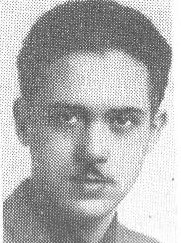
Henry Kuttner was an American author of science fiction, fantasy and horror.
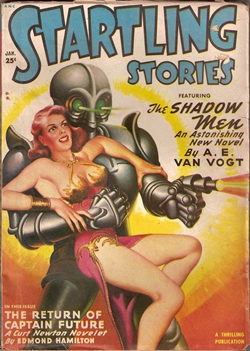
Startling Stories was an American pulp science fiction magazine, published from 1939 to 1955 by publisher Ned Pines' Standard Magazines. It was initially edited by Mort Weisinger, who was also the editor of Thrilling Wonder Stories, Standard's other science fiction title. Startling ran a lead novel in every issue; the first was The Black Flame by Stanley G. Weinbaum. When Standard Magazines acquired Thrilling Wonder in 1936, it also gained the rights to stories published in that magazine's predecessor, Wonder Stories, and selections from this early material were reprinted in Startling as "Hall of Fame" stories. Under Weisinger the magazine focused on younger readers and, when Weisinger was replaced by Oscar J. Friend in 1941, the magazine became even more juvenile in focus, with clichéd cover art and letters answered by a "Sergeant Saturn". Friend was replaced by Sam Merwin Jr. in 1945, and Merwin was able to improve the quality of the fiction substantially, publishing Arthur C. Clarke's Against the Fall of Night, and several other well-received stories.
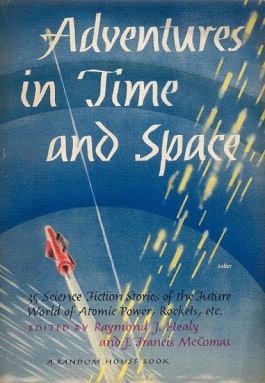
Adventures in Time and Space is an American anthology of science fiction stories edited by Raymond J. Healy and J. Francis McComas and published in 1946 by Random House. A second edition was also published in 1946 that eliminated the last five stories. A Modern Library edition was issued in 1957. When it was re-released in 1975 by Ballantine Books, Analog book reviewer Lester del Rey referred to it as a book he often gave to people in order to turn them onto the genre. It is now once again out of print.
"Kelvin Kent" was a pseudonym shared by writers Henry Kuttner and Arthur K. Barnes. The byline appeared on a series of 12 science fiction stories published in Thrilling Wonder Stories from 1939 to 1944, featuring protagonist "Pete Manx". Leigh Brackett noted that the stories were inspired by Edmond Hamilton's 1938 TWS story "Easy Money". Comics Journal essayist Donald Phelps described Manx as "a lumpen prole Broadwayite. .. A grubby, pragmatic Damon Runyonite [who] embarked on time-traveling errands: these, at the behest of his scientist-buddy, inauspiciously named 'Dr. Mayhem'". Six stories in the series are ascribed to Kuttner, four to Barnes, and two are reportedly collaborations.
"The Portable Star" is a science fiction short story by American writer Isaac Asimov, which appeared in the Winter 1955 issue of Thrilling Wonder Stories. "The Portable Star" was Asimov's least favorite story.

The Outer Reaches is an anthology of science fiction stories edited by August Derleth. It was first published by Pellegrini & Cudahy in 1951. The stories had originally appeared in the magazines Fantasy & Science Fiction, Astounding Stories, Blue Book, Maclean's, Worlds Beyond, Amazing Stories, Fantastic Adventures, Thrilling Wonder Stories and Galaxy Science Fiction or in the anthology Invasion from Mars.
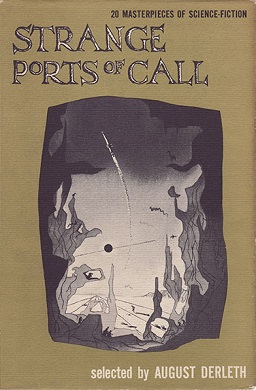
Strange Ports of Call is an anthology of science fiction stories edited by American writer August Derleth. It was first published by Pellegrini & Cudahy in 1948. The stories had originally appeared in the magazines Blue Book, Amazing Stories, Weird Tales, Science and Invention, Astounding Stories, Coronet, The New Review, The Black Cat, Thrilling Wonder Stories, Wonder Stories, Comet, The Saturday Evening Post, Collier's Weekly and Planet Stories.

The Best Science Fiction Stories: 1949 is a 1949 anthology of science fiction short stories edited by Everett F. Bleiler and T. E. Dikty. It was the first published anthology to present the best science fiction stories for a given year. The stories had originally appeared in 1948 in the magazines Planet Stories, Astounding Science Fiction, Blue Book, Comment, and Thrilling Wonder Stories. The anthology was later combined with the 1950 volume and reissued as Science Fiction Omnibus.

The Best Science Fiction Stories: 1950 is a 1950 anthology of science fiction short stories edited by Everett F. Bleiler and T. E. Dikty. An abridged edition was published in the UK by Grayson in 1951 under the title The Best Science Fiction Stories. The stories had originally appeared in 1949 in the magazines Astounding, The Saturday Evening Post, Fantasy and Science Fiction, Fantastic Adventures, Maclean’s, Thrilling Wonder Stories, Blue Book and Startling Stories. The anthology was later combined with the 1949 volume and reissued as Science Fiction Omnibus.

Robots Have No Tails is a 1952 collection of science fiction short stories by Lewis Padgett. It was first published by Gnome Press in 1952 in an edition of 4,000 copies. The stories all originally appeared in the magazine Astounding Stories.
Vintage Season is a science fiction novella by American authors Catherine L. Moore and Henry Kuttner, published under the joint pseudonym "Lawrence O'Donnell" in September, 1946. It has been anthologized many times and was selected for The Science Fiction Hall of Fame, Volume 2A.

Ahead of Time is a collection of science fiction stories by the American writer Henry Kuttner, first published in hardcover by Ballantine Books in 1953, with a paperback edition shortly afterwards. A British hardcover appeared in 1954, with a paperback following in 1961. Paperback reissues of both the UK and US editions appeared in the mid-1960s. A French translation appeared in 1962 and an Italian translation in 1971.
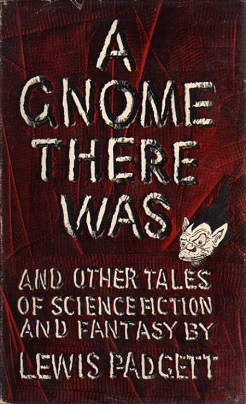
A Gnome There Was is a collection of science fiction and fantasy stories by American writers Henry Kuttner and C. L. Moore, published under their Lewis Padgett pseudonym by Simon & Schuster in 1950. No other editions were issued.

Souls in Metal: an Anthology of Robot Futures is an anthology of robot-themed science fiction short stories edited by Mike Ashley. It was first published in hardcover by Robert Hale in February 1977 in the United Kingdom, with an American hardcover edition following from St. Martin's Press in June of the same year, and a paperback edition from Jove/HBJ in June 1978.

The Other Worlds is an anthology of science fiction, fantasy, and horror stories, edited by Phil Stong. It was originally published by Wilfred Funk in 1941, with a lower-price edition following from Garden City Publishing a year later. The Encyclopedia of Science Fiction describes it as "the first important sf Anthology".; it remains in the collection of nearly 200 academic libraries in 2015.

My Best Science Fiction Story is an anthology of science fiction short stories edited by Leo Margulies and Oscar J. Friend. It was first published in hardcover by Merlin Press in November 1949, and reprinted in August 1950. An abridged paperback edition including twelve of its twenty-five stories was published by Pocket Books in July 1954 and reprinted in November 1955.

The Shape of Things is an anthology of science fiction short stories edited by Damon Knight. It was first published in paperback by Popular Library in 1965.

The Best of Henry Kuttner is a collection of science fiction and fantasy short stories by American author Henry Kuttner. It was first published in hardback by Nelson Doubleday in February 1975 and in paperback by Ballantine Books in April of the same year as a volume in its Classic Library of Science Fiction. The book was reissued in trade paperback by Del Rey/Ballantine in March 2007 under the alternate title The Last Mimzy: Stories. and in ebook by Gateway/Orion in May 2014 and Diversion Books in August 2014. It was later gathered together with Fury and Mutant into the omnibus collection Fury / Mutant / The Best of Henry Kuttner, issued in trade paperback and ebook by Gollancz in December 2013. It has also been translated into Spanish.
References
- ↑ Knight, Damon (1965). Beyond tomorrow: ten science fiction adventures. New York: Harper & Row. OCLC 862217.
- ↑ Nicoll, James Davis (2020-11-12). "Science Fiction's Very First "Year's Best" Anthology". Tor.com. Retrieved 2021-02-25.
- ↑ Kuttner, Henry (2010). Detour to otherness. C. L. Moore. Royal Oak, Mich.: Haffner Press. ISBN 978-1-893887-18-3. OCLC 680295205.